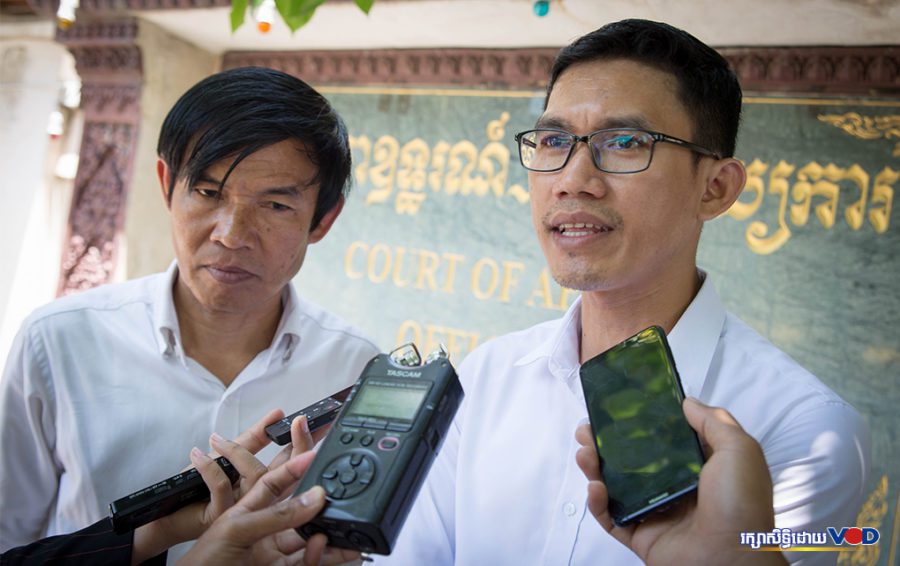Two former Radio Free Asia (RFA) reporters on trial for espionage denied accusations in court on Friday that they had spied on behalf of a foreign state, while acknowledging that they had sent news reports to the U.S.-funded outlet after its Phnom Penh office closed.
The court testimony contradicts an emailed statement made by an RFA spokesman to the Phnom Penh Post and Voice of America in November 2017 that after the broadcaster shuttered local operations in September, the two journalists had “no contractual nor any other relationship with RFA to provide news or other services.”
The spokesman, Rohit Mahajan, declined to comment on Monday, saying the trial is ongoing.
Phnom Penh Municipal Court officials questioned Uon Chhin, formerly a videographer, and Yeang Sothearin, a former news editor, over their handover of digital files to U.S. Embassy officials in 2017, during a period when RFA management was considering closing its Phnom Penh office, which faced government pressure.
Chhin said he had given a hard disk to a U.S. Embassy official upon the request of an unnamed colleague, and claimed he did not know what the files contained.
Asked to verify Chhin’s account of the delivery, a U.S. Embassy spokeswoman on Friday declined to comment.
RFA closed its Phnom Penh bureau in September 2017 while under pressure from authorities related to alleged tax and media license violations.
Both journalists admitted in court on Friday that “they had continued sending videos and information to RFA after it had shut down, but they denied that this constituted espionage,” Al Jazeera reported on Friday.
“You know that you are not a journalist any more, so why did you still send a report?” prosecutor Seng Heang asked, according to Al Jazeera.
“I did it out of passion,” Chhin replied.
Sothearin said he did not “think the information affected national security,” in response to a similar question in court.
Chhin said he had sent video clips to RFA’s Khmer service, but “they were recordings of incidents that had been widely reported throughout Cambodia and did not concern state secrets,” RFA reported on Friday, citing unspecified media reports.
“Sothearin told the court that he had worked on two stories for RFA after leaving the organization, but said they also concerned issues that were reported by local media and known to the public,” RFA reported.
The reporters were arrested in November 2017 amid a media crackdown that saw dozens of radio stations shuttered and The Cambodia Daily and RFA close their Phnom Penh newsrooms.
The pair were charged with providing a foreign state with information prejudicial to national defense and later with producing pornographic videos. They were jailed for nine months until their release on bail in August 2018.
Defense lawyers Kong Pisey and Sam Chamroeun said that the questioning of their clients indicated that there was no evidence to assign them guilt.
Am Sam Ath, deputy director of monitoring at rights group Licadho, agreed, saying that the evidence presented in court did not incriminate the reporters on the charge of spying for a foreign state.
“We did not see any information that would affect national security,” Sam Ath said.
Speaking to reporters outside the courthouse, Chhin and Sothearin both said they hoped the court would provide justice and drop the charges against them.
Chhin said he wished that the court would free them so they could work and move freely, including going abroad for health check-ups.
“If the courts drops the charges, we will be able to find jobs more easily,” he said.
In a statement issued on Friday, five U.N. special rapporteurs on human rights, including Rhona Smith, special rapporteur on the situation of human rights in Cambodia, called on the Cambodian government “to take immediate and meaningful action to protect the safety of journalists who are attacked for exercising their right to freedom of expression.”
The U.N. experts highlighted the criminal proceedings against Chhin and Sothearin.
In a response on Saturday, the government Cambodia Human Rights Committee said the trial was not a crackdown on press freedom and expression.
“The government’s earlier legal measures do not specifically target any group or person as these baseless accusations [from the U.N. experts] suggest,” the rights committee said in a statement.
Last week, however, Reporters Without Borders (RSF) said no serious evidence supporting the “trumped-up charge” of espionage had been produced. In separate statements, the Committee to Protect Journalists and Human Rights Watch (HRW) said the court should drop the charges against the journalists.
“The fabricated case against the ex-RFA journalists is intended as a strike against media that dares to criticize the Cambodian government,” said Phil Robertson, HRW’s deputy Asia director. “Chhin and Sothearin should never have had to face these bogus espionage charges, and all judicial restrictions on them should be lifted.”
Cambodia is ranked 143rd out of 180 countries in RSF’s 2019 World Press Freedom Index, down one place from 2018.
Chhin and Sothearin’s trial resumes on August 9.
Additional reporting by Matt Surrusco and Michael Dickison
Updated on July 30 with RFA spokesman declining comment.
(Translated and edited from the original articles on VOD Khmer)













